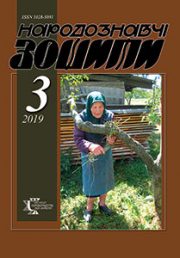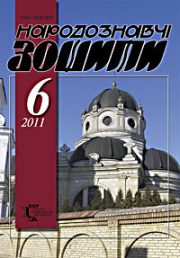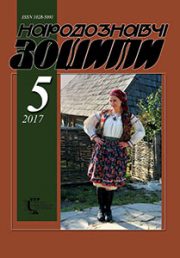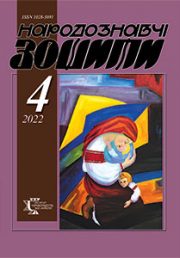The Ethnology Notebooks. 2024. № 3 (177), 663—669
UDK 811.161.2’28:398
DOI https://doi.org/10.15407/nz2024.03.663
LINGUISTIC IMPLEMENTATION OF ARCHETYPAL IDEAS ABOUT OBSERVANCE OF CUSTOMS AND RITUALS
KOVALENKO Nataliia
- ORCID ID: https://orcid.org/0000-0002-7810-1982
- Doctor of Philology,
- Professor of the Department of Ukrainian Language,
- Kamianets-Podilskyi Ivan Ohiienko National University,
- 61, I. Ohienka Str., 32302, Kamianets-Podilskyi, Ukraine,
- Contacts: e-mail: ndm.kovalenko@gmail.com
Abstract. Modern ideas about the importance of observing customs and traditions are based on archetypal ones, which were developed on the basis of collective experience and are linked to a person’s perception and understanding of the laws of surrounding world.
The relevance of the suggested study is due to the need for ethnolinguistic research into the varieties of reflection of the nation’s ethnic culture by means of linguistic units.
The purpose of the article is to determine how the form of Ukrainian language phraseology expression reflects the attitude of an ethnic group to observance of customs, traditions, moral norms and rules of conduct. The object of the study is fixed folk expressions that reflect the archetypal idea of the concept of «by custom, tradition» with attention to accompanying words and components. The material was based on published texts of coherent dialect speech from different territories of Ukraine, as well as the author’s recordings from the territory of Podillia and adjacent dialects.
Phraseological units with a distinct anthropological character are capable of reflecting ethnic consciousness, mentality, national character, material and spiritual culture. This versatility is related to the complex nature of fixed expressions: conceptual and thematic unlimitedness, changeability, variability, spatiality, etc.
Phraseological units in narrative texts about the past and the present is a linguistic means of communication, and also emphasise the importance of preserving traditions and moral values in all spheres of human life, and of observing the norms of behavior.
The repertoire of nominations to denote concepts of folk traditions, customs, norms of behaviour, morality and their evaluative characteristics in dialect speech is wider than in the literary language. This is confirmed by synonymous and antonymic series of lexemes and phraseological units with evaluation and commentary, which often reflect multi-temporal layers, and their core is formed by stylistically neutral nominals (or components) such as custom, law, order, fashion, etc.
The above facts demonstrate the undoubted prospects of the topic under development.
Keywords: dialect, dialectism, lexeme, phraseological unit, custom, tradition, rite, culture.
Received 10.05.2024
REFERENCES
- Azhniuk, B.M. (1989). English phraseology in cultural and ethnic coverage. Kyiv [in Ukrainian].
- Kononenko, V.I. (2002). Language. Culture. Style. Kyiv; Ivano-Frankivsk [in Ukrainian].
- Holianych, M. (2018). Linguistic portrait of the village of Tiudiv (Vоl. 1) [in Ukrainian].
- Hrytsenko, P.Iu. (2015). Information space of a dialect text. Dialects in synchrony and diachrony: text as a source of information studies (Pр. 100—118). Kyiv [in Ukrainian].
- (1970—1980). Dictionary of the Ukrainian language (Vоl. I—ХI). Kyiv: Naukova dumka [in Ukrainian].
- (1996). Dialects of the Chernobyl zone. Texts. Kyiv [in Ukrainian].
- Deliusto, M. (2016). Ukrainian Danube dialect: a collection of dialect texts. Izmail [in Ukrainian].
- Arkushyn, H.L. (2010). Voices from Volyn Polissia. Texts. Lutsk [in Ukrainian].
- Arkushyn, H.L. (2022). Ukrainian dialects of Pidliashshia: modern oral speech. Lutsk [in Ukrainian].
- Babych, H.D. (2002). «The power of God» in national phraseology. Urok ukrainskoi, 2, 28—29 [in Ukrainian].
- Myholynets, O.F., & Pyskach, O.D. (2004). Ukrainian Transcarpathian dialects. Texts. Uzhhorod [in Ukrainian].
- Rusnak, N., Huivaniuk, N., & Buzynska, V. (2006). Bukovynian dialects: a textbook of dialect texts. Chernivtsi [in Ukrainian].
- Liesnova, V.V. (2013). Dialects of the Eastern Slobozhanshchyna: a collection of dialect texts. Luhansk [in Ukrainian].
- Martynova, H.I., Denysenko, Z.M., & Shcherbyna, T.V. (2008). Southern Kyiv region dialects: a collection of dialect texts. Cherkasy [in Ukrainian].
- Hlukhovtseva, K.D., Liesnova, V.V., & Nikolaienko, I.O. (2011). Ukrainian Eastern Slobozhanshchyna dialects: modern dialect texts. Luhansk [in Ukrainian].
- Arkushyn, H.L. (2007). Voiced from Pidliashshia. Teksty. Lutsk [in Ukrainian].







